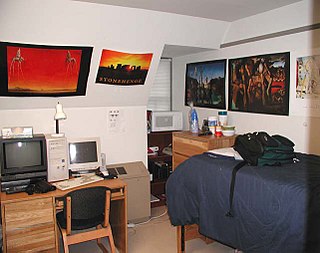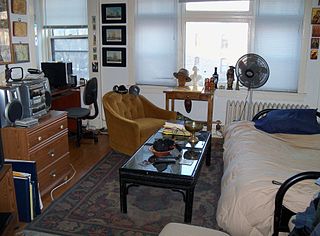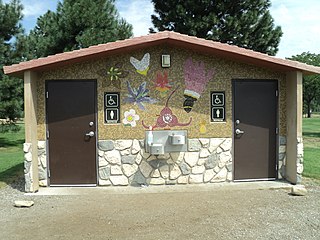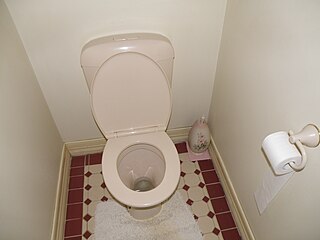
A euphemism is an innocuous word or expression used in place of one that is deemed offensive or suggests something unpleasant. Some euphemisms are intended to amuse, while others use bland, inoffensive terms for concepts that the user wishes to downplay. Euphemisms may be used to mask profanity or refer to topics some consider taboo such as disability, sex, excretion, or death in a polite way.
A dysphemism is an expression with connotations that are derogatory either about the subject matter or to the audience. Dysphemisms contrast with neutral or euphemistic expressions. Dysphemism may be motivated by fear, distaste, hatred, contempt, or humour.

A bathroom or washroom is a room, typically in a home or other residential building, that contains either a bathtub or a shower. The inclusion of a wash basin is common. In some parts of the world e.g. India, a toilet is typically included in the bathroom; in others, the toilet is typically given a dedicated room separate from the one allocated for personal hygiene activities. In North American English the word 'bathroom' is sometimes used to refer to any room in a residence that contains a toilet, regardless of the inclusion of a bath or shower.

A dormitory is a building primarily providing sleeping and residential quarters for large numbers of people such as boarding school, high school, college or university students. In some countries, it can also refer to a room containing several beds accommodating people.
A plumbing fixture is an exchangeable device which can be connected to a plumbing system to deliver and drain water.

A studio apartment, also known as a studio flat (UK), a self-contained apartment (Nigeria), efficiency apartment, bed-sitter (Kenya) or bachelor apartment, is a small apartment in which the normal functions of a number of rooms – often the living room, bedroom, and kitchen – are combined into a single room.

A changing-room, locker-room, or changeroom is a room or area designated for changing one's clothes. Changing-rooms are provided in a semi-public situation to enable people to change clothes with varying degrees of privacy.

Some toilets in Japan are more elaborate than toilets commonly found in other developed nations. European countries often have a toilet and a bidet separate whilst Japan combines an electronic bidet with the toilet. The current state of the art for Western-style toilets in Japan is the bidet toilet, which, as of March 2016, is installed in 81% of Japanese households. In Japan, these bidets are commonly called washlets, a brand name of Toto Ltd., and include many advanced features rarely seen outside of Asia. The feature set commonly found on washlets are anal hygiene, bidet washing, seat warming, and deodorization. Japanese toilets are well known in popular culture and often parodied in comedic works set in Japan.

A public toilet, restroom, public bathroom or washroom is a room or small building with toilets and sinks for use by the general public. The facilities are available to customers, travelers, employees of a business, school pupils and prisoners and are commonly separated into male and female toilets, although some are unisex, especially for small or single-occupancy public toilets.
A pay toilet is a public toilet that requires the user to pay. It may be street furniture or be inside a building, e.g. a shopping mall, department store, or railway station. The reason for charging money is usually for the maintenance of the equipment. Paying to use a toilet can be traced back almost 2000 years, to the first century BCE. The charge is often collected by an attendant or by inserting coins into an automatic turnstile; in some freestanding toilets in the street, the fee is inserted into a slot by the door. Mechanical coin operated locks are also used. Some more high tech toilets accept card or contactless payments. Sometimes, a token can be used to enter a pay toilet without paying the charge. Some municipalities offer these tokens to residents with disabilities so these groups aren't discriminated against by the pay toilet. Some establishments such as cafés and restaurants offer tokens to their customers so they can use the toilets for free but other users must pay the relevant charge.

Potty parity is equal or equitable provision of public toilet facilities for females and males within a public space.

Unisex public toilets are public toilets that are not separated by gender or sex.

A female urinal is a urinal designed for the female anatomy to allow for ease of use by women and girls. Different models enable urination in standing, semi-squatting, or squatting postures, but usually without direct bodily contact with the toilet. Sitting models also exist, and are designed for body contact with the urinal.

Accessible toilets are toilets that have been specially designed to better accommodate people with physical disabilities. Persons with reduced mobility find them useful, as do those with weak legs, as a higher toilet bowl makes it easier for them to stand up. Additional measures that can be taken to add accessibility to a toilet include providing more space, adding grab bars to ease transfer to and from the toilet seat, and providing extra room for a caregiver if necessary. Some countries have requirements concerning the accessibility of public toilets. Toilets in private homes can be modified (retrofitted) to increase accessibility.

In a building or large vehicle, like a ship, a room is any space enclosed within a number of walls to which entry is possible only by a door or other dividing structure that connects it either to a passageway, to another room, or to the outdoors, that is large enough for several people to move about, and whose size, fixtures, furnishings, and sometimes placement within the building or ship support the activity to be conducted in it.
Sexual slang is a set of linguistic terms and phrases used to refer to sexual organs, processes, and activities; they are generally considered colloquial rather than formal or medical, and some may be seen as impolite or improper.

A toilet is a piece of sanitary hardware that collects human urine and feces, and sometimes toilet paper, usually for disposal. Flush toilets use water, while dry or non-flush toilets do not. They can be designed for a sitting position popular in Europe and North America with a toilet seat, with additional considerations for those with disabilities, or for a squatting posture more popular in Asia. In urban areas, flush toilets are usually connected to a sewer system that leads to septic tanks in isolated areas. The waste is known as blackwater and the combined effluent including other sources is sewage. Dry toilets are connected to a pit, removable container, composting chamber, or other storage and treatment device, including urine diversion with a urine-diverting toilet.
A pejorative or slur is a word or grammatical form expressing a negative or a disrespectful connotation, a low opinion, or a lack of respect toward someone or something. It is also used to express criticism, hostility, or disregard. Sometimes, a term is regarded as pejorative in some social or ethnic groups but not in others, or may be originally pejorative but later adopt a non-pejorative sense in some or all contexts.

A toilet is a small room used for privately accessing the sanitation fixture (toilet) for urination and defecation. Toilet rooms often include a sink (basin) with soap for handwashing, as this is important for personal hygiene. These rooms are typically referred to as "half-bathrooms".
A bathroom bill is the common name for legislation or a statute that denies access to public toilets by gender or transgender identity. Bathroom bills affect access to sex-segregated public facilities for an individual based on a determination of their sex as defined in some specific way, such as their sex as assigned at birth, their sex as listed on their birth certificate, or the sex that corresponds to their gender identity. A bathroom bill can either be inclusive or exclusive of transgender individuals, depending on the aforementioned definition of their sex. Unisex public toilets are one option to avoid this controversy.













